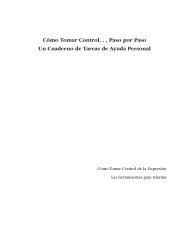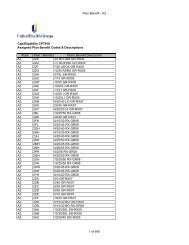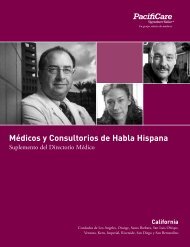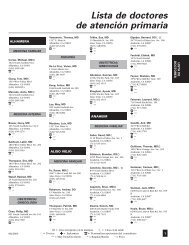CALIFORNIA - Pacificare Health Systems
CALIFORNIA - Pacificare Health Systems
CALIFORNIA - Pacificare Health Systems
You also want an ePaper? Increase the reach of your titles
YUMPU automatically turns print PDFs into web optimized ePapers that Google loves.
PART A<br />
92<br />
Member Eligibility<br />
Retiree<br />
Retiree is a former University Employee receiving<br />
monthly benefits from a University-sponsored defined<br />
benefit plan.<br />
Survivor<br />
A deceased Employee’s or Retiree’s Family Member<br />
receiving monthly benefits from a University-sponsored<br />
defined benefit plan.<br />
You may continue University medical plan coverage as<br />
a Retiree when you retire or start collecting retirement<br />
or disability benefits from a University-sponsored<br />
defined benefit plan, or as a Survivor when you start<br />
collecting survivor benefits from a University-sponsored<br />
defined benefit plan. You must also meet the following<br />
requirements:<br />
1. You meet the University’s service credit<br />
requirements for Retiree medical eligibility;<br />
2. The effective date of your Retiree status is within<br />
120 calendar days of the date employment ends<br />
(or the date of the Employee/Retiree’s death for a<br />
Survivor); and<br />
3. You elect to continue coverage at the time of<br />
retirement;<br />
If you are eligible for Medicare, see “Effect of Medicare<br />
on Retiree Enrollment” below.<br />
Eligible Dependents (Family Members)<br />
When you enroll any Family Member, your signature<br />
on the enrollment form or the confirmation number<br />
on your electronic enrollment attests that your Family<br />
Member meets the eligibility requirements outlined<br />
below. The University and/or the Plan reserves the<br />
right to periodically request documentation to verify<br />
eligibility of Family Members including any who are<br />
required to be your tax dependent(s). Documentation<br />
could include a marriage certificate, birth certificate(s),<br />
adoption records or Federal Income Tax Return or<br />
other official documentation.<br />
Spouse: Your Legal Spouse or Domestic Partner.<br />
Child: All eligible children must be under the limiting<br />
age (18 for legal wards, 23 for all others), unmarried,<br />
and may not be emancipated minors. The following<br />
categories are eligible:<br />
a. Your natural or legally adopted children;<br />
b. Your stepchildren (natural or legally adopted<br />
children of your Spouse or Domestic Partner),<br />
if living with you, dependent on you or your<br />
Spouse for at least 50 percent of their support<br />
and are your or your Spouse’s Dependents for<br />
income tax purposes.<br />
c. Grandchildren of you, your Spouse or your<br />
Domestic Partner, if living with you, dependent<br />
upon you or your Spouse for at least 50 percent<br />
of their support and are your or your Spouse’s<br />
Dependents for income tax purposes.<br />
d. Children for whom you are the legal guardian, if<br />
living with you, who are dependent on you for<br />
at least 50 percent of their support and who are<br />
your Dependents for income tax purposes.<br />
Continuing Coverage for Certain Disabled<br />
Dependents<br />
Any child described above (except a legal ward) who<br />
is incapable of self-support due to a physical or mental<br />
handicap may continue to be covered past age 23<br />
provided the:<br />
a. Incapacity began before age 23, the child was<br />
enrolled in a group medical plan before age 23<br />
and coverage is continuous; and<br />
b. Child is claimed as your Dependent for income<br />
tax purposes or is eligible for Social Security<br />
Income or Supplemental Security Income as<br />
a disabled person or working in supported<br />
employment which may offset the Social Security<br />
or Supplemental Income; and<br />
c. The child lives with you if he or she is not your or<br />
your Spouse’s natural or adopted child.<br />
Application must be made to the Plan 31 days prior to<br />
the child’s 23rd birthday and is subject to approval by<br />
the Plan. The Plan may periodically request proof of<br />
continued disability.<br />
Incapacitated children approved for continued<br />
coverage under a University-sponsored medical plan<br />
are eligible for continued coverage under any other<br />
University-sponsored medical plan. If enrollment<br />
is transferred from one plan to another, a new<br />
application for coverage is not required.<br />
If you are a newly hired Employee with an<br />
incapacitated child, you may also apply for coverage for<br />
that child. The child must have had continuous group








